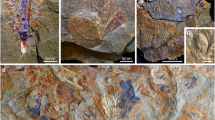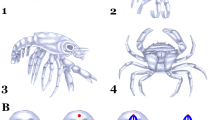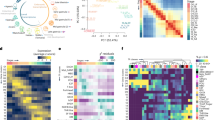Abstract
Rhabdopleura is one of three pterobranch genera which as hemichordates are important in our understanding of the evolution of the chordates1. Its biology and life cycle are very incompletely understood. So far, the most suitable marine laboratory for studying this genus has been Bergen, where R. normani has been well investigated2. This species, however, has to be kept at temperatures less than 12° C, and is dredged from a hard, rocky bottom in rather deep water.
This is a preview of subscription content, access via your institution
Access options
Subscribe to this journal
Receive 51 print issues and online access
$199.00 per year
only $3.90 per issue
Buy this article
- Purchase on SpringerLink
- Instant access to the full article PDF.
USD 39.95
Prices may be subject to local taxes which are calculated during checkout
Similar content being viewed by others
References
Berrill, N. J., The Origin of Vertebrates (Oxford, 1955).
Burdon-Jones, C., Univ. Bergen Årb. Naturv. R., 11, 1 (1954).
Hincks, T., History of British Marine Polyzoa (London, 1880).
Schepotieff, A., Zool. Jb. (Anat.), 23, 463 (1907).
Burdon-Jones, C., in Parker and Haswell's Textbook of Zoology, 2, Seventh edit. (revised by Marshall, A. J.) (London, 1964).
Vaney, A., and Conte, A., Rev. Suisse Zool., 14, 143 (1906).
Lankester, E. R., Q. J. Microsc. Sci., 24, 622 (1884).
Author information
Authors and Affiliations
Rights and permissions
About this article
Cite this article
STEBBING, A. Discovery of Rhabdopleura (Hemichordata) at Plymouth. Nature 217, 1284 (1968). https://doi.org/10.1038/2171284a0
Received:
Revised:
Issue date:
DOI: https://doi.org/10.1038/2171284a0
This article is cited by
-
A ?protective shell? around the larval cocoon of Cephalodiscus densus Andersson, 1907 (Graptolithoidea, Hemichordata)
Polar Biology (2004)
-
Graptolithen aus ordovizischen Geschieben und die frühe Stammesgeschichte der Graptolithen
Paläontologische Zeitschrift (1977)
-
The larva of Rhabdopleura compacta (Hemichordata)
Marine Biology (1973)
-
The structures of the tentacles of Rhabdopleura compacta (Hemichordata) with special reference to neurociliary control
Zeitschrift f�r Zellforschung und Mikroskopische Anatomie (1972)
-
Aspects of the reproduction and life cycle of Rhabdopleura compacta (Hemichordata)
Marine Biology (1970)



